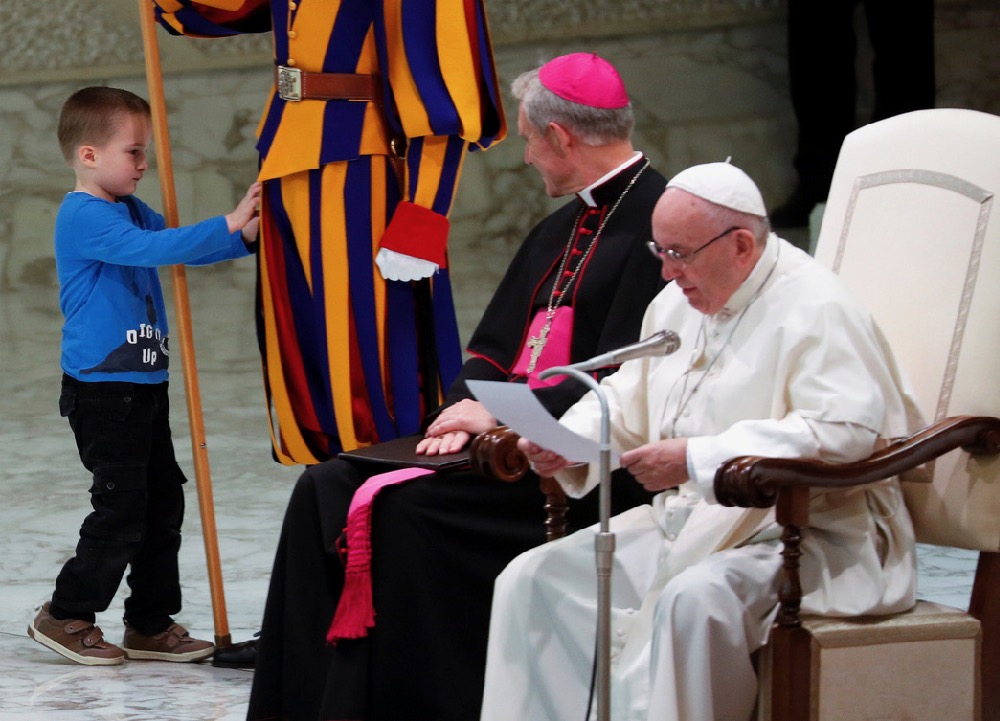The papal audience turned one view of autism on its head yesterday.
Rather than a problem to be “avoided" or “managed”, the sight of a six-year-old autistic boy, Wenzel, roaming around the Paul VI audience hall during the weekly set-piece papal event was turned into a teaching moment.
“This boy can't talk, he is mute,” Pope Francis, who seemed happy with the boy’s interruption, told the crowd. “But he knows how to communicate. He knows how to express himself. He has something that made me think.”
Francis went on: “He is free. A undisciplined freedom... but he is free. It made me think, 'am I also free like that before God?"
The 81-year-old Jesuit Pope was speaking after Wenzel had climbed onto the audience stage seemingly oblivious to the fact Francis was mid-way through his weekly general audience attended by thousands from across the world.
Walking straight past the Pope, the youngster made his way over to the Swiss Guard standing ramrod straight nearby. Wenzel, whose form of autism means he does not speak, touched the military officer’s hand while examining the red cuffs of the guard’s medieval tunic.
The boy’s mother, Lidia, who is from the Pope’s homeland of Argentina, told La Nacion that she was “desperate” and “scared” when she saw Wenzel charge for the stage during Francis major weekly event, and immediately ran up to the stage to try and retrieve her son.
It was a moment that many parents of autistic children can relate to her: that time during Mass or an important public event when your child won’t stand still or makes a noise. Unlike other parents, however, there is little they can do about it.
Wenzel resisted his mother and wasn’t interested in engaging with the Pope. The boy’s sister later made her own dash onto the stage in a failed attempt bring her brother back to the audience and listen to Francis’s reflection on the gospel.
But the Pope told Lidia not to worry. Let him run free, he urged her. For it was Wenzel who had taught Francis something.
“When Jesus says that we have to become like children, He tells us that we have to have the freedom that a child has before his father,” the Pope explained. “I think he [Wenzel] preached to all of us. Let's ask for the grace that this boy can speak.”
Many parents with autistic children suffer in a hopeless silence. There are the awkward situations at social gatherings that must be avoided; a constant worry about your offspring’s future and even suffering the hurt of disapproving looks from fellow churchgoers when your child causes a disturbance.
The video of Wenzel interrupting the general audience has gone viral; watched shared and liked across the world. It is the first time that autism has been presented to the world in such a positive light.
That in itself underlines that the revolutionary power of the papacy is an ability show the world that suffering and disability is not something to shunned or hidden away. Instead, Francis argues, it is through suffering that we learn about God and humanity.
Archbishop Georg Ganswein, the Prefect of the Papal Household, was with Wenzel and reached out his arms to the boy. Archbishop Ganswein has a reputation as the well-turned out Vatican official who spent years at the side of Benedict XVI (he remains the Pope Emeritus’ private secretary). He’s been ill at ease under the pontificate of the Francis papacy with the off the cuff remarks and impromptu pastoral gestures.
But yesterday, after Wenzel ran off, the Pope turned to Archbishop Ganswein and joked: “He’s Argentinian, undisciplined.”
At the heart of the story here is that suffering causes vulnerability, and vulnerability can change people and relationships. “When I am weak, then I am strong,” St Paul writes in the Letter to the Corinthians.
Autistic children are some of the weakest and neediest in society. Yesterday, one of them became a star, and offered an important lesson.



 Loading ...
Loading ...